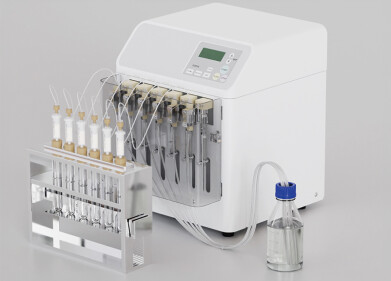Sample preparation
Selecting an organic modifier for reversed-phase chromatography
Feb 21 2023
Acetonitrile (MeCN) and methanol (MeOH) are the most used organic modifiers in reversed-phase chromatography. Both solvents offer different selectivity, making them valuable for method development purposes. However, it is important to consider the various characteristics of each solvent when deciding which one to use.
When selecting an organic solvent, properties such as miscibility with water, polarity, UV cut-off, viscosity and safety are important to consider. For example, Tetrahydrofuran (THF) and isopropanol (IPA) can be useful as both provide high elution strength. However, IPA use is limited due to its high viscosity (leading to low performance and high back pressures), whilst THF can degrade pump seals, along with PEEK tubing and fittings and requires the use of stabilising agents such as BHT to prevent peroxide formation. Acetone is an inexpensive solvent, with similar elution properties to acetonitrile, although its high UV absorbance limits its applicability for some applications.
Acetonitrile and methanol have become the two organic modifiers of choice for many reversed-phase applications. Both solvents are fully miscible with water and are compatible with common mobile phase additives and buffers (although care should be taken when using buffer salts at high organic compositions). However, each solvent has advantages and disadvantages that should be considered. For example, the cost of acetonitrile is significantly higher than that of methanol and methanol is also less toxic. However, acetonitrile has a lower UV cut-off than methanol (190 nm vs 205 nm), making it more suitable for use in applications requiring low UV detection wavelengths. In addition, acetonitrile/water mixes have lower viscosity than methanol/water mixes and therefore generate substantially lower back pressures across the LC column. This lower backpressure is often seen as advantageous as it puts less strain on the LC system components and column, and provides scope to increase flow rate and reduce run times.
In conclusion, when selecting an organic modifier for reversed-phase chromatography, it is important to consider the various characteristics of each solvent and how they will affect the final analysis. Acetonitrile and methanol are both commonly used solvents, each offering different selectivity and advantages, and it is often application dependent on which one to use.
More information online
Events
May 11 2025 Vienna, Austria
May 18 2025 Tempe. AZ, USA
May 21 2025 Birmingham, UK
Jun 01 2025 Baltimore, MD, USA
Jun 15 2025 Bruges, Belgium














